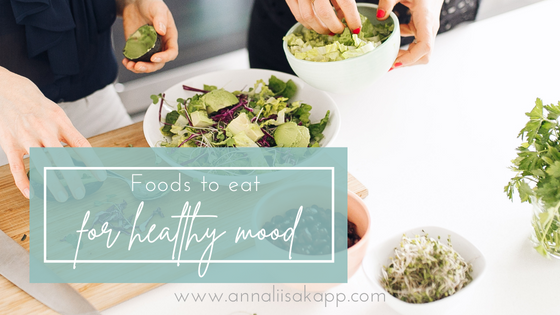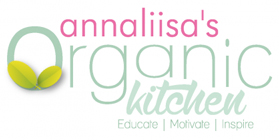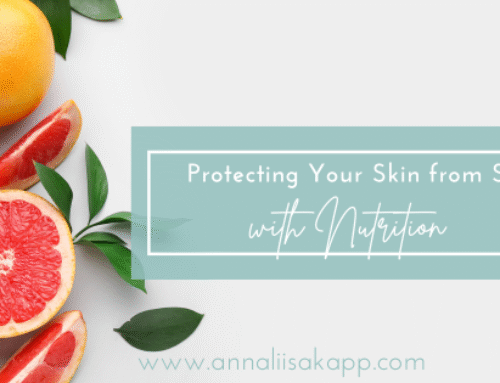
.
No question that what you eat can affect how you feel, right?
Mental health and brain health are complex. So are the foods we eat, and the ways our bodies interact with those foods. While, we don’t know the exact mechanisms how food and nutrition help, we know a few ways food impacts our moods.
First, what we eat becomes the raw materials for our neurotransmitters and hormones. “Neurotransmitters” are biochemical messengers that allow our nerve cells to communicate (ever heard of serotonin?). They are important not just for thinking and memory, but also for mental health.
Second, what we eat affects our blood sugar. And having unstable blood sugar levels can contribute to mood swings.
And thirdly, what we eat affects our gut microbes & inflammation in the digestive tract, which has a direct impact on our mood & overall brain health via the Gut-Brain-Axis, but also affects how we are able to digest & utilize the nutrients we get from food.
Let’s talk about mood-boosting and mood-busting foods.
.
Mood-boosting foods
Some nutrient deficiencies look like mental health problems; this includes deficiencies in B-vitamins, vitamin D, and the mineral selenium. So, getting enough vitamins, minerals, (and other things like antioxidants) are key. These nutrients not only reduce inflammation but also fuel the biochemical reactions in our bodies. Including those that create neurotransmitters. So make sure you’re eating a variety of nutrient-dense whole foods, especially fresh fruits and vegetables. In fact, studies show that people who eat the most fruits and vegetables are the happiest.
Some superfoods that help with mood include:
- Blueberries
- Turmeric
- Dark leafy greens
- Cabbage
- Sea vegetables
Also pay special attention to vitamin D (the sunshine vitamin), as it’s not naturally occurring in too many foods.
Make sure you get enough protein. Protein is your body’s main supply of amino acids. Amino acids are very important for mood issues because they are the building blocks of neurotransmitters. Protein also helps to regulate blood sugar. I recommend eating protein with every meal; this includes wild cold water fish, hemp seeds, eggs, poultry, and grass-fed meat.
Complex carbohydrates like sweet potato and quinoa. They allow better absorption of key amino acids like tryptophan. Tryptophan is used by your body to make serotonin (your “happy hormone”) and melatonin (your “sleepy” hormone). So, if you want to relax, try these in the evening.
Fish and other sources of omega-3 fatty acids (nuts, seeds, and algae) are also mood-boosting. Omega-3s are definitely “brain food” and help to ease symptoms of depression, anxiety, brain fog, and declining memory.
Gut & liver loving nutrients. Your gut microbes communicate to your brain via the vagus nerve. They are also responsible for protecting the body against certain toxins that can alter our mood, help to produce mood regulating B vitamins, and keep our digestive system strong so we can absorb all our nutrients. My favourite ways to support the gut include: adding traditionally fermented foods, a variety of tubers and antioxidant rich fruits and veggies that include prebiotics (like pears and leeks), detox superfoods like beets to help the liver, and amino acids from bone broth.
FUN FACT: One study showed that giving one multi-vitamin and one omega-3 fish oil tablet per day to prison inmates reduced the incidence of violent behavior by 50%!
Last but not least, make sure you’re hydrated. Mild dehydration can cause mood issues as well.
Mood-busting foods
You won’t be surprised to hear me say processed foods are mood-busters, right? One study suggests that eating a lot of processed foods devoid of nutrients can increase your chances of becoming depressed by as much as 60 percent! This is on top of the research that shows nutrient deficiencies can look like mental health problems.
“But it makes me feel good!”
Yes, some of these mood busters can make you feel better temporarily. Some big food companies study how to maximize the “pleasure” centers with the perfect amount of refined sugar, salt, and inflammatory fats (ex. canola or soy oil). Not to mention the color, texture, and taste; they can light up our taste buds and make us feel good… for now.
A few other things to avoid are:
- Alcohol (nervous system depressant)
- Caffeine (may worsen anxious feelings and ability to sleep)
- Processed Sugar (messes with your blood sugar and can worsen inflammation)
- Gluten (can lead to gut inflammation – which then leads to brain inflammation, causes nutrient deficiencies, and can negatively impact our thyroid)
Conclusion
Bad moods can lead to bad eating habits; and, bad eating habits can lead to bad moods. If you need a mood boost, stick to minimally processed nutrient-dense whole foods. Things like fresh fruit and vegetables (including leafy greens), nuts and seeds, eggs, fish, poultry, and meat. Avoid common mood-busting foods like alcohol, caffeine, gluten containing foods and refined sugar.
And remember, sometimes “feel good” junk foods, only make you feel good temporarily.
The Winter Season of AOK Nutrition Plan Program featured theme is: Cognitive Health
We combine empowering education about how your body works with simple weekly tweaks and action steps to support your brain health.
- Find solutions to root causes of brain fog, memory loss, and changes in mood
- Learn how to optimize your cognitive health & mood through nutrition & lifestyle strategies for mental clarity & reducing irritability, anger and even overwhelm
- Understand which hormones, neurotransmitters & systems in the body impact your mood & how to detect which areas need your attention most
- Learn to make simple swaps in your daily foods that have a big impact on your mood, memory, and mental clarity
- Find out if your current lab results are in the optimal range, how to request functional testing + how to decide which test is the most important one to start with for you
Investment includes:
- 10 Seasonal DFY Meal Plans to make meal planning easy and effortless
- Step by step prep guide to save you time
- Shopping Lists for Each Plan to save money and time
- Brand & Pantry Guides to take the guesswork out of which brands to buy
- Extra Seasonal Recipes Booklet for fun & easy weekend, drink, and dessert recipes
CLICK HERE TO LEARN MORE AND REGISTER. (USE SAVINGS CODE AOKWINTER FOR EARLY BIRD SAVINGS)





